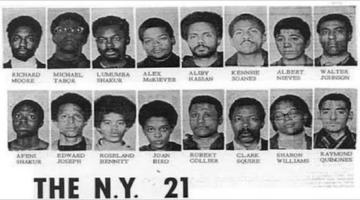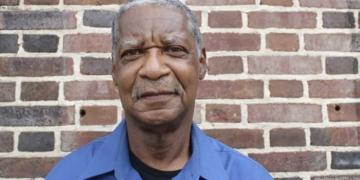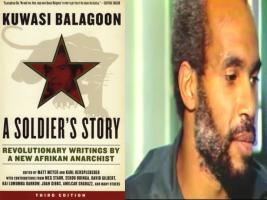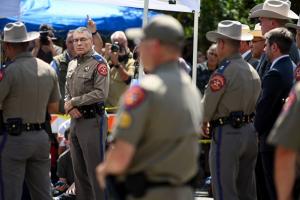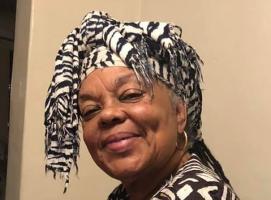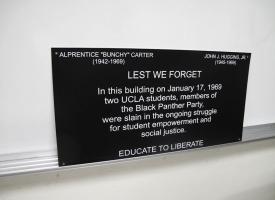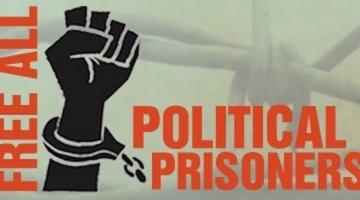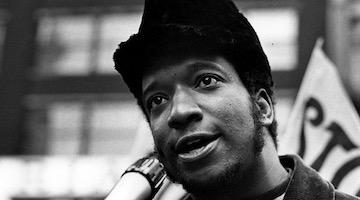Just like we glorified the black leather jackets, black berets, and guns in the 60s, we still romanticize African people with guns and mouths that fire more inaccurately than the guns they carry.
“We cannot expect to rely on individuals, regardless of how charismatic and intelligent, to ‘lead’ our struggle because all of us are works in progress.”
Revolutionary or Death is the 2020 biography written about former Black Panther Party (BPP) Minister of Information Leroy “Eldridge” Cleaver. The book was written by Justin Clifford. Eldridge Cleaver without question was an enigmatic figure within the BPP and Clifford attempts to use this biography to show a balanced view of Eldridge Cleaver as insightful and talented while also displaying Cleaver’s brutality and ruthlessness.
Most people engaged in studying the history of African liberation movements in general and the BPP in particular already have some understanding of the contradictions within the BPP. Eldridge personified those contradictions. On the positive side, his open willingness to use the royalties from his best-selling book Soul on Ice to help finance the early stages of the BPP, and his work to establish the Los Angeles BPP Branch (the first outside of Oakland, California, U.S.), are clear examples here. It was Eldridge who recruited Alprentice “Bunchy” Carter into the BPP after their days doing time together at Folsom Prison in California during the 1960s. Carter, along with Fred Hampton, probably remain as the most iconic and respected BPP leaders to this day. Also, Cleaver’s work, along with people like Kwame Ture (Stokely Carmichael) and others to make the Panthers a national organization cannot be overstated.
On the dysfunctional side, Cleaver’s admitted focus on using rape as a method of controlling women is obviously disgraceful. And, along with that behavior was Cleaver’s consistent physical brutality against women, especially his longtime wife Kathleen Cleaver. And, then there’s Cleaver’s constant sexual manipulation and exploitation of women. And, his selfish and narcissistic behavior in this regard is also represented by his adventuristic and ideologically underdeveloped understanding of revolutionary theory and practice. It was his lack of understanding in this area that led to multiple people being killed, including Lil Bobby Hutton. Also, Cleaver’s underdeveloped political consciousness led the Panthers into an unsustainable position of confrontation against the U.S. government with nothing close to the capacity to engage that position. Then finally, there was Cleaver’s talent for creating and implementing the political personality that would best serve his individual interests. From being a model inmate in prison to becoming a member and eventual prison leader for the Nation of Islam. Then becoming a Marxist/Leninist and one of the primary voices for the BPP. Then he became first a born again right wing Christian before becoming a member of the Unification Church (Moonies). Then, he became a Mormon, and provocative clothes designer before reclaiming some of his radical left ideas during the last period of his life. Cleaver seemed to use identity the way most people use fashion, to represent the flavor of the day that works best for that day’s objective.
“His selfish and narcissistic behavior in regard to women is also represented by his adventuristic and ideologically underdeveloped understanding of revolutionary theory and practice.
The contradictions related to Cleaver’s seemingly chameleon life created a broader question about the Black Panther Party itself. Due to the Federal Bureau of Investigation (FBI) counter-intelligence inspired beef between Cleaver and BPP co-founder Huey P. Newton, most people tend to view the two of them as opposites. The truth is much more complex, and that truth further defines the strengths and weaknesses within the BPP itself. Like Cleaver, Newton made major contributions to the BPP and the African liberation struggle in general. His vision in creating the Black Panther Party for Self-Defense provided the blueprint that current organizations like Black Lives Matter still borrow heavily from. And, his individual courage in being willing to publicly confront armed police in the name of justice provided a role model that people all over the world grew and benefited from. I remember being 13 years old and stealing a copy of a Playboy magazine that my father’s friend provided to him when my father was hospitalized. After staring at the naked pictures, I stumbled upon an article in the magazine, and it was the picture for the article that captured my imagination. It was Newton in the rattan chair with the African spear and shotgun, outfitted as a Panther, staring uncompromisingly ahead. I also recall the title of that article. It was “Why Blacks Aren’t Scared Anymore.” Today, I understand clearly that capitalism has always promoted the narrative that our people were scared to stand up for ourselves (and unfortunately, most of us don’t study our history enough to realize how untrue this is), but there is no question that Newton’s vision and practice made a major contribution to increasing the militancy in not only our movements, but in our communities all over the world.
Also like Eldridge Cleaver, Newton had a history of brutality and ruthlessness to all genders of people. And, also like Cleaver, Newton’s abuse of drugs brought out more of his dysfunctional behavior at the expense of all those who suffered because they looked to Newton (and Cleaver) for principled leadership.
“Newton’s vision and practice made a major contribution to increasing the militancy in not only our movements, but in our communities all over the world.”
The reality of these contradictions with Eldridge Cleaver and Newton reflects the broader contradictions that plague us as a people, and society as a whole. What these situations demonstrate is that we cannot expect to rely on individuals, regardless of how charismatic and intelligent, to “lead” our struggle because all of us are works in progress. Maybe not to the extremes mentioned here, but all of us have positives and negatives. Yet, all of us have unlimited potential to make much needed and necessary contributions. Still, the history of the BPP, Newton, Cleaver, etc., shows us that individual leadership is not the answer. The word cadre is used often today, but most people using it cannot demonstrate any true understanding of its meaning. Unlike its popular usage, the term isn’t inseparable from European communist parties. It doesn’t mean people who occupy privileged decision-making positions. Instead, it simply means persons who personify the principles and practices of revolutionary life through what they do on a consistent basis. By principles, we mean valuing humanity over all else and practicing patience, selflessness, and consistency with the people regardless of any and all obstacles that get in the way.
The development of collective cadre can only happen within a collective revolutionary process. That cannot mean haphazard discussions. It cannot mean intense intellectual study accompanied by nothing else. It can only mean mass processes where study and the tools of collective development i.e. criticism/self-criticism and democratic centralism, are utilized and institutionalized on an systemic basis.
“The term ‘cadre’ means persons who personify the principles and practices of revolutionary life through what they do on a consistent basis.”
Clearly, all of us deserve some of the blame for the behaviors of Eldridge Cleaver, Newton and others because we did not build in processes to challenge their behaviors and hold them accountable. Instead, we built up these individual leaders as being larger than life and therefore incapable of being criticized. Examples of this are Eldridge Cleaver’s erratic and dictatorial behavior in carrying out the ill-advised shootout against Oakland police two days after Dr. Martin Luther King Jr. was assassinated (where Lil Bobby Hutton was killed). His dictatorial and abusive behavior while representing the BPP in Cuba and then Algeria, and North Korea. And, Newton’s abuse of power throughout the 70s which not only got people killed, but also contributed to numerous Panthers being incarcerated for long periods of time. These examples are still relevant today because we continue to make the same errors. Even in 2021, too many of us are still swayed by the symbolism of organization and power to which the BPP represented clearly during the 1960s. Just like we glorified the black leather jackets, black berets, and guns in the 60s, we still romanticize African people with guns and mouths that fire more inaccurately than the guns they carry. And, this is still a problem for us simply because most of us have never been involved in any actual organization of our people against injustice because if we were, we would be able to see the clear difference between real power/organization and the symbol of such. If we had actual experience, we could never be so easily fooled into becoming excited about anything except the real thing. And, we would know that by the real thing, we mean us building capacity to win and not just creating imagery to make us feel better without any positive changes in our material conditions.
The Panthers are gone today. Most of the people claiming to be Panthers now wanted nothing to do with the Panthers during the 60s. If you listen to people talk now, you would think the Panthers had millions of members when the reality is they never had more than a couple of thousand actual working members, if that. And, of those who would join the BPP or similar organizations, too many of us were looking for someone to occupy the hot seat for us. Make all of the hard decisions. Someone to weather the criticism because we are not willing to occupy that position. Until we advance past this juvenile consciousness and accept the reality that liberation is a mass phenomenon we will never move forward. until we have mass, collective cadre leadership, we will continue to come up short. There are never going to be anymore Huey P. Newtons, Eldridge Cleavers, Malcolm X’s, Kwame Tures, etc., to occupy the position of “leader.” And, there shouldn’t be because we don’t need “leaders.” What we need are organizers who are willing to work with our people to establish and build foundation for real political power. And by political power we don’t mean the occupation of individual elected positions within the capitalist system (with no mass movement to hold those individuals and the system accountable). What we mean is what Kwame Ture defined as “the power of the organized masses of people,” meaning a movement controlled by the masses, not individuals. This reality represents power so mass and collective that one, two, or 20 people cannot control it and/or be co-opted by it. A movement so broad that no matter what individuals do and/or come and go, we will retain capacity to carry forward in an organized direction representative of mass decision making processes and actions.
“What we need are organizers who are willing to work with our people to establish and build foundation for real political power.”
To his credit, Kwame Ture came to understand the need for collective leadership and his work within the All African People’s Revolutionary Party (A-APRP) after his time in the Student Non-Violent Coordinating Committee and Black Panther Party expressed this understanding. For the last 30 years of his life, Ture worked to make a contribution towards the A-APRP, Democratic Party of Guinea (PDG), African Party for the Independence of Guinea-Bissau (PAIGC), and other Pan-African formations becoming the collective cadre leadership organizations that we need. As a result of his efforts, this work continues today 20+ years after his physical transition, which is the clearest example possible of why mass cadre leadership, not individual leaders, are important. When the individual leader dies or changes political direction their work stops. When there is mass leadership, the work continues regardless of what happens to individuals.
In the final analysis, we know who Eldridge Cleaver and Huey P. Newton are because of their monumental contributions to our struggle for justice. We should continue to honor those contributions, but we should also learn from their contradictions in order to help us build stronger mechanisms for our future struggle. May is African Liberation Day month. No day represents the push for mass collective African leadership more than African Liberation Day. Hopefully, we can use future years of commemorating African Liberation Day to solidify the need for continued mass movement development.
Ahjamu Umi is revolutionary organizer with the All African People's Revolutionary Party, adviser, and liberation literature author.
This article previously appeared in Hood Communist.
COMMENTS?
Please join the conversation on Black Agenda Report's Facebook page at http://facebook.com/blackagendareport
Or, you can comment by emailing us at comments@blackagendareport.com


